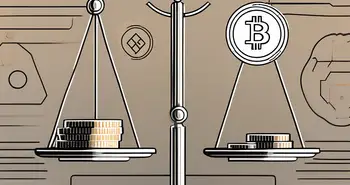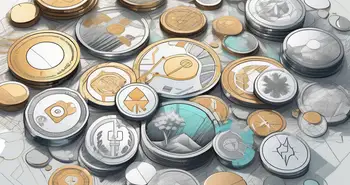From ERC-20 to Beyond: The Guide to Token Standards

As an expert in blockchain technology, I am excited to present to you The Ultimate Guide to Token Standards. In this comprehensive article, we will delve into the world of token standards, their importance, the different types available, their role in blockchain technology, how to choose the right one, and the future of token standards.
Understanding Token Standards
In order to fully grasp the concept of token standards, we must first answer the question: What are Token Standards? Token standards are a set of rules and specifications that determine how a certain type of token functions on a blockchain. These standards ensure consistency and interoperability among different tokens, making it easier for developers and users to interact with them.
Token standards are essentially blueprints that define the characteristics, behavior, and capabilities of a token. They enable tokens to be seamlessly exchanged, transferred, and utilized in various applications and platforms.
The Importance of Token Standards
Token standards play a crucial role in the world of blockchain technology. They establish a common language and framework for tokens, facilitating their widespread adoption and use across different projects and ecosystems.
By adhering to token standards, developers can focus on building innovative applications and services, without worrying about compatibility issues. Users can easily understand and interact with tokens, regardless of the underlying blockchain infrastructure.
Moreover, token standards enhance the security and trustworthiness of tokens. They provide a solid foundation for developers to ensure that tokens function as intended, without any vulnerabilities or loopholes that can be exploited.
Imagine a world without token standards; chaos would ensue, and the potential of blockchain technology would be severely limited.
Different Types of Token Standards
Let's explore some of the most prominent token standards that have emerged in the blockchain space:
ERC-20 Standard
The ERC-20 standard, also known as the Ethereum Token Standard, is one of the most widely adopted token standards. It defines a set of rules for fungible tokens on the Ethereum blockchain. Fungible tokens are interchangeable and identical to each other, making them ideal for representing currencies or assets.
ERC-20 tokens have revolutionized the cryptocurrency world, enabling the creation of countless decentralized applications (DApps) and facilitating fundraising through Initial Coin Offerings (ICOs).
ERC-721 Standard
In contrast to ERC-20, the ERC-721 standard introduced non-fungible tokens (NFTs) to the blockchain. NFTs are unique and indivisible, representing ownership of a specific item or asset. They have given rise to the booming market of digital art, collectibles, and virtual assets.
The ERC-721 standard has unlocked new possibilities in gaming, virtual reality, and provenance tracking, providing a secure way to prove ownership of digital items.
ERC-1155 Standard
As the blockchain ecosystem evolved, the need for a token standard that could support both fungible and non-fungible tokens became apparent. The ERC-1155 standard was introduced to fill this gap.
ERC-1155 tokens are highly versatile, allowing for the creation of hybrid tokens that can represent both unique and divisible assets. This flexibility opens up exciting possibilities for blockchain-based gaming, digital marketplaces, and more.
The Role of Token Standards in Blockchain Technology
Token standards not only bring order and consistency to the realm of tokens, but they also serve as a foundational element of blockchain technology.
Ensuring Interoperability in Blockchain
Interoperability is crucial in the blockchain space, as it allows different tokens and platforms to seamlessly communicate and interact with each other. Token standards promote interoperability by providing a common set of rules and protocols that all participants can adhere to.
Thanks to token standards, tokens can be easily traded across different decentralized exchanges, integrated into various wallets, and utilized within a wide range of applications. This interoperability fosters a vibrant and interconnected blockchain ecosystem.
Facilitating Smart Contracts
Smart contracts, which are self-executing agreements coded on the blockchain, rely heavily on token standards. By adhering to a token standard, smart contracts can efficiently interact with tokens, implementing functionalities such as transfers, approvals, and token-based conditions.
Token standards simplify the implementation of smart contracts, making it easier for developers to build sophisticated decentralized applications that leverage tokens as a core component. They enable the seamless integration of tokens into complex smart contract logic, opening the door to innovative use cases and decentralized financial systems.
Choosing the Right Token Standard
When deciding which token standard to use for your project, there are several factors to consider:
Factors to Consider
1. Purpose: Determine the specific use case of your token and choose a standard that aligns with your objectives. Consider whether you need a fungible or non-fungible token, and if hybrid capabilities are necessary.
2. Ecosystem: Evaluate the existing ecosystem and community support for each token standard. Consider the availability of development tools, documentation, and community resources that can assist with the implementation and maintenance of your token.
3. Scalability: Assess the scalability prospects of each token standard. Consider the transaction throughput, gas fees, and potential scalability solutions offered by the underlying blockchain.
Pros and Cons of Different Standards
Each token standard has its own strengths and weaknesses. For instance, ERC-20 tokens offer broad compatibility and liquidity but may not be suitable for representing unique assets. On the other hand, ERC-721 tokens excel at representing non-fungible assets but may have limited scalability. ERC-1155 tokens provide a middle ground, combining both fungible and non-fungible capabilities.
By carefully weighing the pros and cons of each token standard against your project requirements, you can make an informed decision that aligns with your vision and objectives.
Future of Token Standards
The world of token standards is constantly evolving, driven by technological advancements and the growing demands of the blockchain ecosystem.
Emerging Token Standards
New token standards continue to emerge, aiming to address specific use cases and improve upon existing standards. Some notable examples include the ERC-777, which enhances the functionality of ERC-20 tokens, and the ERC-998, which enables the creation of composable tokens.
These emerging token standards demonstrate the ongoing innovation in the blockchain space, as developers and researchers push the boundaries of what is possible with tokens.
The Impact of Technological Advancements on Token Standards
The future of token standards is closely intertwined with advancements in blockchain technology. As scalability solutions like Ethereum 2.0 and layer 2 protocols mature, token standards may benefit from improved transaction speeds, lower fees, and enhanced functionality.
Furthermore, the integration of token standards with other emerging technologies, such as decentralized finance (DeFi) and Internet of Things (IoT), will unlock new possibilities and use cases for tokens.
Conclusion
In conclusion, token standards play a pivotal role in the development and adoption of blockchain technology. They provide a common language and framework for tokens, ensuring interoperability and security. By understanding the different types of token standards, their role in blockchain, and how to choose the right one, you can navigate the world of tokens with confidence.
As an expert in the field, I advise you to stay up to date with the latest token standards, as they continue to evolve and shape the future of blockchain technology. By embracing the power of token standards, you can unlock endless possibilities and contribute to the growth of this transformative technology.
FAQ
What are token standards?
Token standards are a set of rules and specifications that define how a certain type of token functions on a blockchain. They ensure interoperability, consistency, and security among different tokens.
What are some popular token standards?
Some popular token standards include the ERC-20 standard for fungible tokens, the ERC-721 standard for non-fungible tokens, and the ERC-1155 standard for hybrid tokens.
How do token standards facilitate smart contracts?
Token standards provide a common set of rules and protocols that smart contracts can utilize to interact with tokens. They enable the seamless integration of tokens into complex smart contract logic and facilitate the execution of token-based conditions.
How should I choose the right token standard for my project?
When choosing a token standard, consider factors such as your project's purpose, the existing ecosystem supporting each standard, and the scalability prospects. Weigh the pros and cons of each standard against your specific requirements to make an informed decision.
What does the future hold for token standards?
The future of token standards is driven by technological advancements and the demands of the blockchain ecosystem. New token standards will continue to emerge, addressing specific use cases and leveraging advancements in scalability and other technologies.
As you explore the dynamic world of token standards and their impact on the future of blockchain technology, consider taking your investment strategy to the next level with Morpher. Embrace the transformative power of blockchain with Morpher's revolutionary trading platform, where you can trade a vast array of assets, from cryptocurrencies to NFTs, without any fees and with infinite liquidity. Whether you're looking to start with fractional investing, take advantage of short selling, or amplify your trades with up to 10x leverage, Morpher offers a unique and secure trading experience tailored for the modern investor. Sign Up and Get Your Free Sign Up Bonus today, and join the community of traders who are reshaping the world of investing.

Disclaimer: All investments involve risk, and the past performance of a security, industry, sector, market, financial product, trading strategy, or individual’s trading does not guarantee future results or returns. Investors are fully responsible for any investment decisions they make. Such decisions should be based solely on an evaluation of their financial circumstances, investment objectives, risk tolerance, and liquidity needs. This post does not constitute investment advice.

Painless trading for everyone
Hundreds of markets all in one place - Apple, Bitcoin, Gold, Watches, NFTs, Sneakers and so much more.

Painless trading for everyone
Hundreds of markets all in one place - Apple, Bitcoin, Gold, Watches, NFTs, Sneakers and so much more.









